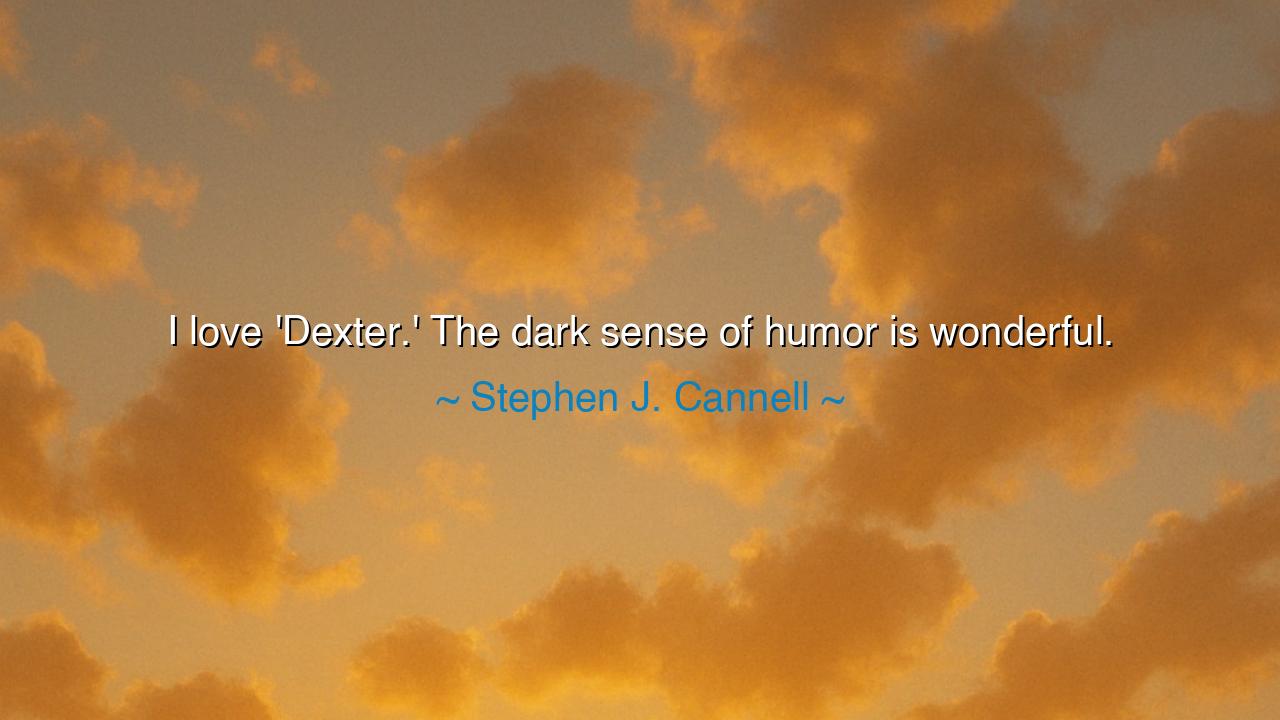
I love 'Dexter.' The dark sense of humor is wonderful.






When Stephen J. Cannell declared, “I love ‘Dexter.’ The dark sense of humor is wonderful,” he was not merely admiring a television series — he was acknowledging a truth that pulses at the heart of human nature: that even amid darkness, the soul yearns to laugh. The genius of Dexter, and of all dark humor, lies in its defiance — it dares to find levity in the abyss, to draw a crooked smile upon the face of tragedy. Cannell, a storyteller of crime and conscience, understood that in the dance between light and shadow, humor is not weakness — it is survival.
To love dark humor is to gaze into the void and not be swallowed by it. The ancients knew this instinct well. The philosophers of Greece, when faced with the madness of men and the cruelty of fate, often laughed not out of mockery, but out of wisdom. Democritus, known as the “laughing philosopher,” found amusement in humanity’s follies, for he saw that grief and laughter were but twin reflections of understanding. Like Dexter, whose life balanced murder and morality, Democritus understood that confronting the darkness within does not demand despair — it demands wit, the sharp sword that slices fear in two.
The story of Dexter Morgan, a man who hunts evil while hiding his own, is a parable of modern times. It reminds us that the boundaries of right and wrong blur when survival meets conscience. And yet, the show’s dark humor rescues it from becoming unbearable — it transforms horror into reflection, cruelty into absurdity. Cannell’s admiration for this art form reveals a profound truth: that humor, when born of darkness, does not trivialize pain — it transforms it into wisdom. It allows the spirit to breathe where it might otherwise suffocate.
So too, history gives us examples of laughter rising from the ashes of despair. During the London Blitz of World War II, when bombs rained upon the homes of ordinary people, the English responded not with silence, but with jokes. Shopkeepers placed signs in the ruins of their stores that read, “More open than usual!” — a humor dark as soot, yet bright as defiance. In that laughter was courage, the will to stand upright before the storm. Just as Dexter turns murder into metaphor, those people turned terror into resilience. Cannell’s words honor this sacred instinct: to laugh at darkness is to rob it of its dominion.
The origin of his admiration is the storyteller’s creed — to face the ugliness of the world without surrendering to despair. Cannell himself crafted tales of crime, vengeance, and moral complexity. He saw that the finest art is not pure light, nor pure shadow, but the interplay between them. In Dexter, he recognized that rare alchemy — where laughter blooms from the grave, and irony becomes a form of truth. The dark sense of humor is not mere entertainment; it is philosophy disguised as jest, a mirror held up to the contradictions of human nature.
To the listener, there is a lesson here as old as the first fire that cast its glow against the cave walls. Do not fear the darkness that life brings, nor hide from the irony of existence. Instead, learn to see through it, to laugh gently at its absurdity. For humor is not a denial of pain — it is the transformation of it. The wise know that tears and laughter flow from the same source, and that sometimes, the greatest wisdom wears the mask of irony.
Therefore, remember this teaching, you who walk through shadowed days: when the world grows grim, let dark humor be your lamp. Laugh, not to mock, but to endure. See the folly of man, the cruelty of fate, and smile — not because it is easy, but because it is noble. In that act of laughter, you rise above despair and claim your freedom. Like Cannell, love the art that makes light of darkness, for therein lies a power older than tragedy itself — the power to live, to understand, and to triumph through laughter.






AAdministratorAdministrator
Welcome, honored guests. Please leave a comment, we will respond soon